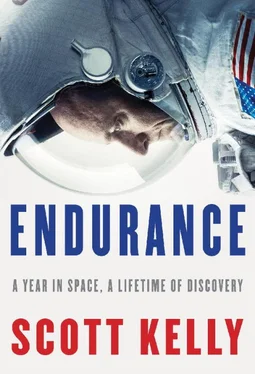Misha, who will be my fellow traveler for a year, is fifty-four and is very different from Gennady—casual, quiet, and contemplative. Misha’s father was a military helicopter pilot working with the cosmonaut rescue forces, and when Misha was only five, his father died in a helicopter crash. His early dreams of flying in space were only reinforced by this unfathomable loss. After serving in the military as a paratrooper, Misha needed to get a degree in engineering from the Moscow Aviation Institute to qualify as a flight engineer. He couldn’t get in, because he wasn’t a resident of the Moscow region, so he became a Moscow police officer to establish residency and was then able to study at the institute. He was selected as a cosmonaut in 1998.
When Misha stares at you with his light blue eyes, it feels like nothing is more important to him than fully comprehending what you are saying. He is more open with his feelings than the other Russians I know. If he were American, I could picture him as a Birkenstock-wearing hippie living in Vermont.
We approach the Kazakh kids gathered to welcome us. We greet them, shake hands, and accept flowers that for all I know are covered with measles. Gennady chats with the children happily, his face lit up with his signature smile.
The entire party—prime crew, backup crew, and support staff—boards two buses for the ride to the quarantine facility where we will spend the next two weeks. (The prime crew and backup crew always travel separately, for the same reason the president and vice president do.) As we are boarding, for a laugh, Gennady sits in the driver’s seat of our bus, and we all take pictures of him with our phones. Many years ago, crews used to travel to Baikonur, spend one day here checking out the Soyuz spacecraft, then travel back to Star City to wait out the two weeks until launch. Now, cutbacks require that we make only one trip, so we will be stuck here for the duration. I take a window seat, pop in my earbuds, and rest my head against the window, hoping to become sleepy enough to take a nap before we get to our hotel-like quarantine facility. This road is in terrible shape—it always has been, and it only gets worse—and the rutted and patched asphalt rattles my head against the window enough to keep me awake.
We pass dilapidated Soviet-era apartment complexes, huge rusted satellite dishes communicating with Russian spacecraft, mounds of garbage randomly strewn about, the occasional camel. It’s a clear, sunny day. We pass Baikonur’s own statue of Yuri Gagarin, this one with his arms raised—not in the triumphant V of a gymnast celebrating a perfect dismount, but the joyful straight-up gesture of a kid about to try a somersault. In this statue, he’s smiling.
Far over the horizon a launch tower rises above the same deteriorating concrete pad from which Yuri first rocketed off Earth, the same pad from which nearly every Russian cosmonaut has left Earth, the same pad from which I will leave Earth two weeks from now. The Russians sometimes seem to care more about tradition than they do about appearance or function. This launchpad, which they call Gagarinsky Start (Gagarin’s Launchpad), is imbued with the successes of the past, and they have no plans to replace it.
Misha’s and my mission to spend a year on ISS is unprecedented. A normal mission to the space station lasts five to six months, so scientists have a good deal of data about what happens to the human body in space for that length of time. But very little is known about what happens after month six. The symptoms might get precipitously worse in the ninth month, for instance, or they might level off. We don’t know, and there is only one way to find out.
Misha and I will collect various types of data for studies on ourselves, which will take a significant amount of our time. Because Mark and I are identical twins, I’m also taking part in an extensive study comparing the two of us throughout the year, down to the genetic level. The International Space Station is a world-class orbiting laboratory, and in addition to the human studies of which I am one of the main subjects, I will also spend a lot of my time this year working on other experiments, like fluid physics, botany, combustion, and Earth observation.
When I talk about the International Space Station to audiences, I always share with them the importance of the science being done there. But to me, it’s just as important that the station is serving as a foothold for our species in space. From there, we can learn more about how to push out farther into the cosmos. The costs are high, as are the risks.
On my last flight to the space station, a mission of 159 days, I lost bone mass, my muscles atrophied, and my blood redistributed itself in my body, which strained and shrank the walls of my heart. More troubling, I experienced problems with my vision, as many other astronauts have. I have been exposed to more than thirty times the radiation of a person on Earth, equivalent to about ten chest X-rays every day. This exposure will increase my risk of a fatal cancer for the rest of my life. None of this compares, though, to the most troubling risk: that something bad could happen to someone I love while I’m in space with no way for me to come home.
Looking out the window at the strange landscape of Baikonur, I realize that for all the time I’ve spent here, weeks in fact, I have never really seen the town itself. I’ve only been to the designated spaces where I have official business: the hangars where the engineers and technicians prepare our spacecraft and rocket for flight; the windowless fluorescent-lit rooms where we get into our Sokol pressure suits; the building where our instructors, interpreters, doctors, cooks, management people, and other support staff stay; and the nearby building, affectionately called Saddam’s Palace by Americans, where we stay. This opulent residence was built to accommodate the head of the Russian space agency and his staff and guests, and he allows the crews to use it while we’re here. It’s a nicer place than the other facility, and far nicer than the austere crew quarters housed in an office building where shuttle astronauts used to spend quarantine at the Kennedy Space Center in Florida. Saddam’s Palace has crystal chandeliers, marble floors, and a four-room suite for each of us, complete with Jacuzzi tubs. The building also has a banya, or Russian sauna, with a cold pool to jump into afterward. Early in our two-week quarantine I go out to the banya to find a naked Misha beating on a naked Gennady with birch branches. The first time I saw this scene I was a bit taken aback, but once I experienced the banya myself, followed by a dip in a freezing cold pool of water and a homemade Russian beer, I completely understood the appeal.
Saddam’s Palace also has an elaborate dining room with pressed white tablecloths, fine china, and a flat-screen TV on the wall that constantly plays old Russian movies the cosmonauts seem to love. The Russian food is good, but for Americans it can start to get old after a while—borscht at nearly every meal, meat and potatoes, other kinds of meat and potatoes, everything covered with tons of dill.
“Gennady,” I say while we are eating dinner a few days into our stay. “What’s with all the dill?”
“What do you mean?” he asks.
“You guys put dill on everything. Some of this food might actually be good if it weren’t covered in dill.”
“Ah, okay, I understand,” Gennady says, nodding, his signature smile starting to emerge. “It’s from when the Russian diet consisted mostly of potatoes, cabbage, and vodka. Dill gets rid of farts.”
Later I google it. It’s true. As it happens, getting rid of gas is a worthwhile goal before being sealed into a small tin can together for many hours, so I stop complaining about the dill.
Читать дальше












